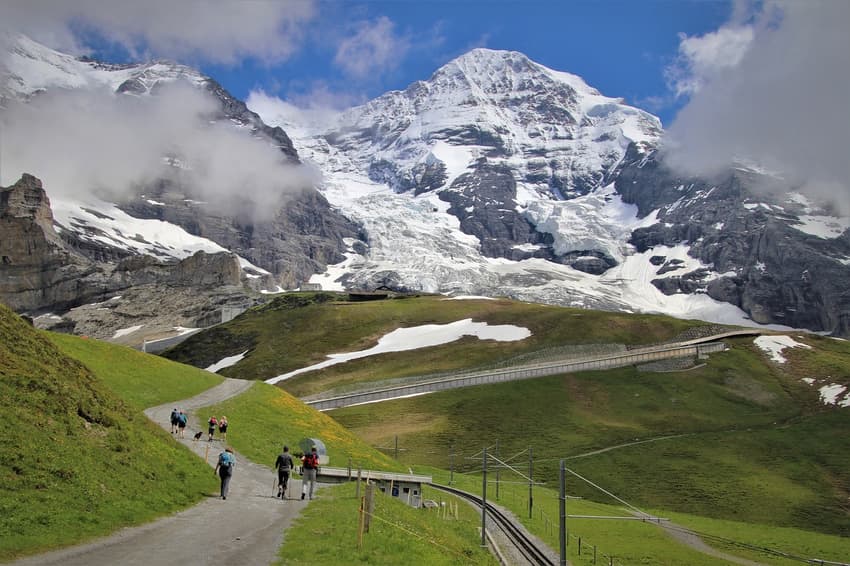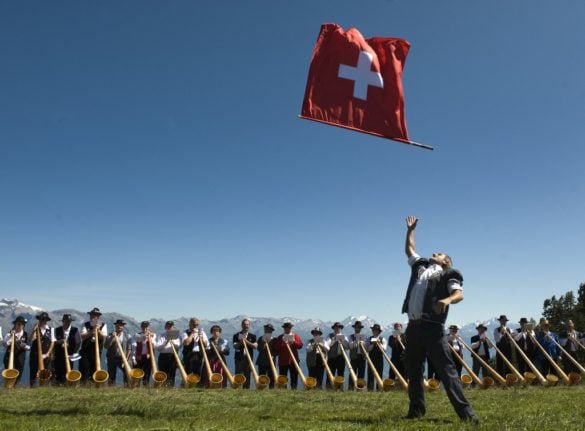Why joining a club in Switzerland offers a fast track to integration

The Swiss are a nation of joiners, and you are missing a trick as a resident if you don’t follow their example and get involved with a non-profit association, Clare O’Dea writes.
Involvement in non-profit associations is very common in Switzerland – 45 percent of adults are members of at least one such entity.
In fact, so many people are involved in associations, it forms an alternative layer of society. Association membership is the perfect gateway to integration into Swiss life, a way to make social connections but also to learn how the country works behind the scenes.
Is there something about the structure and order of this legal entity that appeals to the Swiss character? Associations certainly have strong historic roots in the culture, and are a key part of daily life, being used to maximal effect.
Sporting and cultural life would be non-existent without the free labour of associations, which also provide a legal and organisational framework to get things done at any level, from local to national or even international.
100,000 Swiss associations
The history of associations in Switzerland goes back 300 years. Because the legal basis for setting up and running an association is so simple, they are an easily accessible tool for self-organisation, making them a central plank of civil society.
The 18th century origin of such groups was the preserve of the male elites. Men all over Europe and elsewhere, thirsty for knowledge, formed societies to discuss scientific, medical, philosophical, economic and political advancements. That century saw some 400 societies of varying shelf-life being formed in Switzerland.
Today, there are 100,000 associations in the Alpine country covering every imaginable interest. Men and women are fairly evenly represented, with 48 percent of men and 41 percent of women taking part in at least one.
READ ALSO: Reader question - What does being 'successfully integrated in Switzerland' mean?

Whether a sports club or another association, many Swiss are members of clubs. Photo: Alexander Fox on Pixabay
On a structural level, an association has an executive committee, membership and articles of association. But essentially it is just a group of people pursuing a joint purpose. This can be political, scientific, artistic, religious, charitable or social in nature, as long as the objectives are non-economic.
'Association life'
As an independent and autonomous legal entity, an association can set goals, mobilise people, seek funding. It can even sue the state, like Senior Women for Climate Protection Switzerland (KlimaSenionrinnen Schweiz) is doing. After the association’s complaint against the government lost at appeal in the Federal Supreme Court in 2020, the group took their fight to the European Court of Human Rights.
The ethical purpose of associations is a big part of the reward of getting involved, whether it’s helping to run the local volleyball club, preserve local heritage or save the planet. They create a structure that allows people to contribute to society or a good cause.
Looking more closely at the level of engagement, almost half of people participating in association are involved on at least a weekly basis. The majority are active at least once a month. There’s even a German word for the sector and everything to do with it – das Vereinsleben or association-life.
Every disease or illness has its association, as does every shooting club or yodelling group. Clubs for immigrants are usually run as associations, as are neighbourhood committees, interest groups for the young and the old, the disabled, different professions and art forms.

Flag and alphorns: who said Switzerland is boring? Photo by Fabrice COFFRINI / AFP
All of life is there. And if you’re a foreigner looking to integrate, you should be there too. The easiest way to find your local associations is to look on your commune website which lists them all, with links. Articles appear from time to time bemoaning the decline of Vereinsleben and the lack of new volunteers, so there are always openings.
When a death notice appears in my local newspaper, it is often accompanied by sympathy notices placed by the different associations in which the person was active. Many older people who have spent their life in one place have a full curriculum vitae of volunteering roles.
This is what makes life colourful and meaningful for so many people. Whether it’s pursuing hobbies or working for a good cause, it is one of the best ways to find your tribe.
Do it Yourself
After being invited to join the executive committee of a local cultural association in the canton where I live, I discovered a parallel universe, a web of connections and activities I had known nothing about. From participating in the association’s meetings and events, I learnt so much more about how things work in the canton, who is actually running the show, culturally speaking, and how they do it.
With this experience, I was able to set up an association myself with likeminded people to pursue a new cultural project. The door is open to anyone who wants to avail of this vehicle to create something new, including charitable work.
For all you need to know about running an association in Switzerland (in English!), Vitamin B is an online resource centre that provides information, individual advice and further training. Set up by Migros Culture Percentage, which also includes the adult education institution Migros Club School, Vitamin B is, of course, an association itself.
So next time you drive through a village and see people in high-vis jackets directing traffic to an improvised car park for a popular event, you could ask yourself who these people are and whether it might be worth your while to join the joiners.
This article was first published in May 2023.
Comments
See Also
Involvement in non-profit associations is very common in Switzerland – 45 percent of adults are members of at least one such entity.
In fact, so many people are involved in associations, it forms an alternative layer of society. Association membership is the perfect gateway to integration into Swiss life, a way to make social connections but also to learn how the country works behind the scenes.
Is there something about the structure and order of this legal entity that appeals to the Swiss character? Associations certainly have strong historic roots in the culture, and are a key part of daily life, being used to maximal effect.
Sporting and cultural life would be non-existent without the free labour of associations, which also provide a legal and organisational framework to get things done at any level, from local to national or even international.
100,000 Swiss associations
The history of associations in Switzerland goes back 300 years. Because the legal basis for setting up and running an association is so simple, they are an easily accessible tool for self-organisation, making them a central plank of civil society.
The 18th century origin of such groups was the preserve of the male elites. Men all over Europe and elsewhere, thirsty for knowledge, formed societies to discuss scientific, medical, philosophical, economic and political advancements. That century saw some 400 societies of varying shelf-life being formed in Switzerland.
Today, there are 100,000 associations in the Alpine country covering every imaginable interest. Men and women are fairly evenly represented, with 48 percent of men and 41 percent of women taking part in at least one.
READ ALSO: Reader question - What does being 'successfully integrated in Switzerland' mean?

On a structural level, an association has an executive committee, membership and articles of association. But essentially it is just a group of people pursuing a joint purpose. This can be political, scientific, artistic, religious, charitable or social in nature, as long as the objectives are non-economic.
'Association life'
As an independent and autonomous legal entity, an association can set goals, mobilise people, seek funding. It can even sue the state, like Senior Women for Climate Protection Switzerland (KlimaSenionrinnen Schweiz) is doing. After the association’s complaint against the government lost at appeal in the Federal Supreme Court in 2020, the group took their fight to the European Court of Human Rights.
The ethical purpose of associations is a big part of the reward of getting involved, whether it’s helping to run the local volleyball club, preserve local heritage or save the planet. They create a structure that allows people to contribute to society or a good cause.
Looking more closely at the level of engagement, almost half of people participating in association are involved on at least a weekly basis. The majority are active at least once a month. There’s even a German word for the sector and everything to do with it – das Vereinsleben or association-life.
Every disease or illness has its association, as does every shooting club or yodelling group. Clubs for immigrants are usually run as associations, as are neighbourhood committees, interest groups for the young and the old, the disabled, different professions and art forms.

All of life is there. And if you’re a foreigner looking to integrate, you should be there too. The easiest way to find your local associations is to look on your commune website which lists them all, with links. Articles appear from time to time bemoaning the decline of Vereinsleben and the lack of new volunteers, so there are always openings.
When a death notice appears in my local newspaper, it is often accompanied by sympathy notices placed by the different associations in which the person was active. Many older people who have spent their life in one place have a full curriculum vitae of volunteering roles.
This is what makes life colourful and meaningful for so many people. Whether it’s pursuing hobbies or working for a good cause, it is one of the best ways to find your tribe.
Do it Yourself
After being invited to join the executive committee of a local cultural association in the canton where I live, I discovered a parallel universe, a web of connections and activities I had known nothing about. From participating in the association’s meetings and events, I learnt so much more about how things work in the canton, who is actually running the show, culturally speaking, and how they do it.
With this experience, I was able to set up an association myself with likeminded people to pursue a new cultural project. The door is open to anyone who wants to avail of this vehicle to create something new, including charitable work.
For all you need to know about running an association in Switzerland (in English!), Vitamin B is an online resource centre that provides information, individual advice and further training. Set up by Migros Culture Percentage, which also includes the adult education institution Migros Club School, Vitamin B is, of course, an association itself.
So next time you drive through a village and see people in high-vis jackets directing traffic to an improvised car park for a popular event, you could ask yourself who these people are and whether it might be worth your while to join the joiners.
This article was first published in May 2023.
Join the conversation in our comments section below. Share your own views and experience and if you have a question or suggestion for our journalists then email us at [email protected].
Please keep comments civil, constructive and on topic – and make sure to read our terms of use before getting involved.
Please log in here to leave a comment.